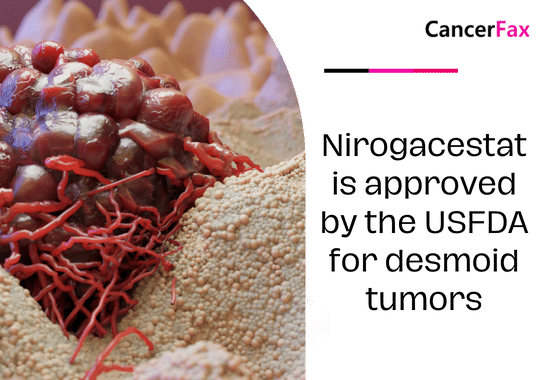The Food and Drug Administration authorized nirogacestat (OGSIVEO, SpringWorks Therapeutics, Inc.) on November 27, 2023, for adult patients with advancing desmoid tumors needing systemic treatment. This is the initial authorized therapy for desmoid tumors.
A study called DeFi (NCT03785964) looked at how well it worked. It was an international, multicenter, randomized (1:1), double-blind, placebo-controlled experiment with 142 patients who had desmoid tumors that were getting worse and could not be treated with surgery. Patients were qualified if the desmoid tumor had advanced within 12 months after screening. Participants were randomly assigned to take 150 mg of nirogacestat or a placebo orally twice a day until illness progression or intolerable toxicity.
Progression-free survival (PFS) calculated by RECIST v1.1 by a blinded independent central review or clinical progression assessed by the investigator and reviewed independently was the main way to measure how well the treatment worked. The median progression-free survival (PFS) was not determined in the nirogacestat group (95% CI: not determined) and was 15.1 months (95% CI: 8.4, not determined) in the placebo group. The hazard ratio (HR) was 0.29 (95% CI: 0.15, 0.55) with a p-value of less than 0.001. An initial investigation of progression-free survival (PFS) using solely radiographic progression revealed a hazard ratio of 0.31 (95% CI: 0.16, 0.62).
The objective reaction rate (ORR) was an extra measure of effectiveness. The Objective Response Rate (ORR) was 41% (95% CI: 29.8, 53.8) for participants in the nirogacestat group and 8% (95% CI: 3.1, 17.3) for those in the placebo group (p-value=<0.001). The improvement in patient-reported worst pain from the beginning of the study, which favored the nirogacestat group, further confirmed the efficacy results.
The prevalent adverse effects included diarrhea, ovarian toxicity, rash, nausea, exhaustion, stomatitis, headache, stomach discomfort, cough, alopecia, upper respiratory tract infection, and dyspnea.
The suggested nirogacestat dosage is 150 mg taken orally twice a day, with or without food, until illness progresses or there is unacceptable toxicity. Each dose of 150 mg is comprised of three 50 mg pills.

Targeting FGFR4 and CD276 with CAR T-cells demonstrates a strong antitumor impact against children rhabdomyosarcoma
Chimeric antigen receptor (CAR) T-cells that specifically target Fibroblast Growth Factor Receptor 4 (FGFR4), a surface tyrosine receptor that is extensively expressed in rhabdomyosarcoma (RMS), are now undergoing clinical research. However, the effectiveness of these CAR T-cells may be hindered by tumor heterogeneity and inadequate activation. In this study, we present a method to enhance the co-stimulatory and targeting characteristics of a FGFR4 CAR through an optimization process. We substituted the hinge and transmembrane domain of CD8 as well as the 4-1BB co-stimulatory domain with the corresponding domains of CD28. The CARs produced exhibit heightened anti-tumor efficacy in multiple RMS xenograft models, with the exception of the RMS559 cell line, which is known for its aggressive nature.

